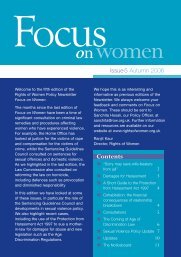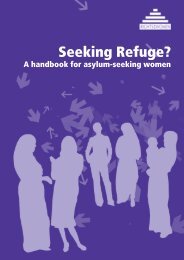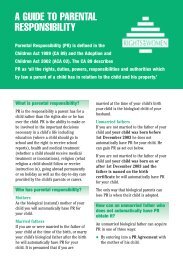DOMESTIC VIOLENCE, IMMIGRATION LAW AND - Rights of Women
DOMESTIC VIOLENCE, IMMIGRATION LAW AND - Rights of Women
DOMESTIC VIOLENCE, IMMIGRATION LAW AND - Rights of Women
You also want an ePaper? Increase the reach of your titles
YUMPU automatically turns print PDFs into web optimized ePapers that Google loves.
the <strong>of</strong>fence. The details are now set out in section 139 <strong>of</strong> the Legal Aid, Sentencing and<br />
Punishment <strong>of</strong> Offenders Act 2012:-<br />
• A sentence <strong>of</strong> over 48 months’ (4 years’) imprisonment is excluded from rehabilitation.<br />
This means it can never be spent.<br />
• A sentence <strong>of</strong> more than 30 months (2 ½ years) and up to, or consisting <strong>of</strong>, 48 months (4<br />
years) has a rehabilitation period <strong>of</strong> 7 years. This means that convictions leading to these<br />
sentences become spent after 7 years from the date <strong>of</strong> completion <strong>of</strong> the sentence (including<br />
any licence period).<br />
• A sentence <strong>of</strong> imprisonment <strong>of</strong> more than 6 months but less than 30 months has a<br />
rehabilitation period <strong>of</strong> 48 months. This means that convictions leading to these sentences<br />
become spent after 48 months (4 years) from the date <strong>of</strong> completion <strong>of</strong> the sentence (including<br />
any licence period).<br />
• Any sentence <strong>of</strong> 6 months’ imprisonment or less has a rehabilitation period <strong>of</strong> 24<br />
months (2 years). This means that convictions leading to these sentences become spent after<br />
2 years from the date <strong>of</strong> completion <strong>of</strong> the sentence. *NB for <strong>of</strong>fences committed while under<br />
18 years for which a sentence <strong>of</strong> 6 months or less is received, the rehabilitation period is 18<br />
months, not half the adult rehabilitation period.<br />
• A fine has a rehabilitation period <strong>of</strong> 12 months. This means that convictions leading to<br />
these sentences become spent after 12 months from the date <strong>of</strong> conviction.<br />
• A community order (such as probation or unpaid work) has a rehabilitation period <strong>of</strong> 12<br />
months. This means a community order becomes ‘spent’ after 12 months from the last day on<br />
which the order is to have effect.<br />
• ‘relevant orders’ including a conditional discharge or a bind-over to keep the peace or be<br />
<strong>of</strong> good behaviour have a rehabilitation period ending on the last day on which the order<br />
is to have effect. Such convictions become spent after that date. *NB for <strong>of</strong>fences committed<br />
while under 18 years which receive a ‘relevant order, the rehabilitation period is the same as<br />
for adults.<br />
• There is no rehabilitation period for an absolute discharge. This means that it becomes<br />
spent straight away.<br />
Therefore, an unspent conviction is a conviction which:-<br />
• Either, because <strong>of</strong> the length <strong>of</strong> sentence, cannot ever be spent. Any <strong>of</strong>fence for which the<br />
sentence was for more than 48 months (4 years) can never be spent.<br />
• Or, is a conviction which can be spent but for which the rehabilitation period is not yet<br />
completed. So, for example, if you were convicted on 1 July 2012 and ordered to pay a fine<br />
(which has a rehabilitation period <strong>of</strong> 12 months), that would not become spent until 1 July 2013,<br />
12 months later.<br />
If you are unsure as to whether you have an unspent criminal conviction or not and want to apply<br />
for leave to remain, you can contact our immigration law advice line, the details <strong>of</strong> which are at the<br />
end <strong>of</strong> this update. You can also check with the lawyer that represented you when you were<br />
convicted (if you had one) or an immigration lawyer.<br />
• What if I need to make an application to the UKBA under the Domestic Violence Rule but<br />
I have an unspent conviction?<br />
You should obtain immigration legal advice, if possible before making any formal application to the<br />
UKBA. Once you find a solicitor or legal adviser you must provide all the details to them, even<br />
about possible <strong>of</strong>fences you are not sure about.<br />
10
















